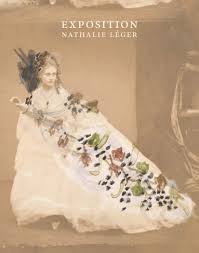Leslie Jamison at Bookforum:
 Léger keeps trying to break away from her mother’s story by scrutinizing the lives of other women, but the maternal shadow—no matter how much she turns away from it—keeps edging into the frame. At their core, these books are about involuntary attention, the subjects we can’t help returning to: Léger tries to write about the Countess of Castiglione and ends up writing about her father’s mistress; she tries to write about Wanda’s divorce and ends up writing about her mother’s; she tries to write about a murdered artist and ends up confronting—finally and fully—her mother’s shame. It is as if every time she picks up a guitar to play, the sounds of a woman’s sobbing emerge from the strings instead. “Only in unfamiliar bedrooms do we perceive with such clarity the true nature of our existence—true because astray,” Léger muses, and by the beginning of The White Dress, the author seems to have accepted that she will always be haunted by backstory: “You must return to one of those unanswered questions, in a room off to the side, you switch on the light and the question is poised there, waiting.” Even when you can’t bring yourself to stare directly at the primal wound, you can’t escape it entirely—and often find yourself, as Léger describes Loden, “a woman telling her own story through that of another woman.” Léger’s own triptych does this as well—following the stories of these other women’s lives into a suite of unfamiliar bedrooms that eventually return her to the aching questions of her own childhood, poised there, waiting.
Léger keeps trying to break away from her mother’s story by scrutinizing the lives of other women, but the maternal shadow—no matter how much she turns away from it—keeps edging into the frame. At their core, these books are about involuntary attention, the subjects we can’t help returning to: Léger tries to write about the Countess of Castiglione and ends up writing about her father’s mistress; she tries to write about Wanda’s divorce and ends up writing about her mother’s; she tries to write about a murdered artist and ends up confronting—finally and fully—her mother’s shame. It is as if every time she picks up a guitar to play, the sounds of a woman’s sobbing emerge from the strings instead. “Only in unfamiliar bedrooms do we perceive with such clarity the true nature of our existence—true because astray,” Léger muses, and by the beginning of The White Dress, the author seems to have accepted that she will always be haunted by backstory: “You must return to one of those unanswered questions, in a room off to the side, you switch on the light and the question is poised there, waiting.” Even when you can’t bring yourself to stare directly at the primal wound, you can’t escape it entirely—and often find yourself, as Léger describes Loden, “a woman telling her own story through that of another woman.” Léger’s own triptych does this as well—following the stories of these other women’s lives into a suite of unfamiliar bedrooms that eventually return her to the aching questions of her own childhood, poised there, waiting.
more here.
